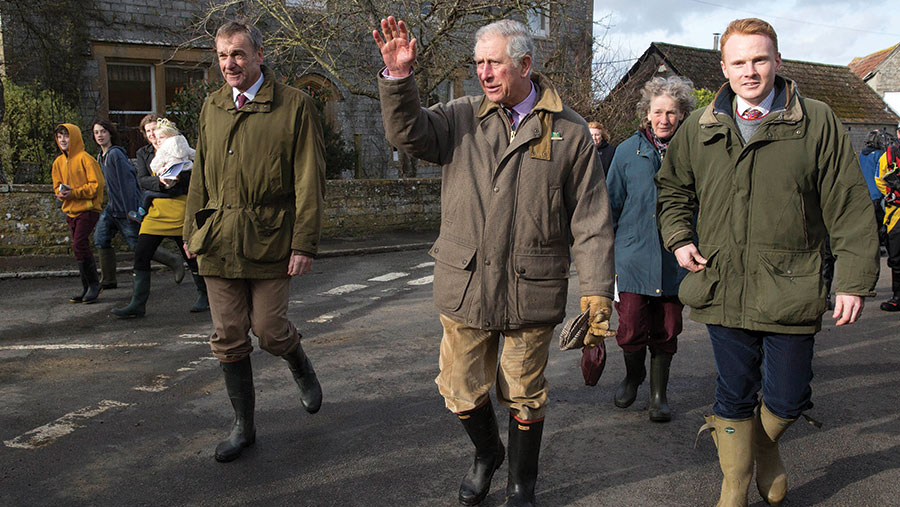Prince Charles calls for action to avert winter farm crisis
 © David Hartley Rex-Shutterstock
© David Hartley Rex-Shutterstock Prince Charles has called for urgent action to avert a major crisis from engulfing Britain’s family farms this winter.
The Prince of Wales issued the warning ahead of a farm crisis summit convened by the Prince’s Countryside Fund charity in Derbyshire on Friday (23 October).
Prince Charles will attend the summit before visiting local farmers. Clarence House said it would bring together charities, banks, landowners and other industry stakeholders to “explore the immediate actions and commitments that are needed to avert a major crisis befalling our farming sector over the winter”.
See also: Farmer must take 400 pictures to join stewardship scheme
The Prince is said to be keen to see for himself the situation faced by producers battling low commodity prices, erratic weather and the prospect of delayed support payments. He is expected to tell industry stakeholders that they have a duty to support farmers in difficult times for the sake of future generations.
The Rural Payments Agency (RPA), which is due to start making basic payments from 1 December, has said that the “vast majority” of farmers in England will be paid by the end of January.
Farmers in other parts of the UK face similar uncertainty.
It isn’t the first time Prince Charles has highlighted the plight of rural communities.
He visited flood-hit farmers in Somerset in February 2014.
The summit will be chaired by Lord Curry of Kirkharle who will give an overview of the “perfect storm” which looks set to hit farmers.
“Pressure on many farms is building in intensity beyond anything we have seen in recent years,” he told Farmers Weekly.
Lord Curry added: “Fear that the RPA may not deliver payments on time this winter is adding to real tension within many small and medium-sized family farming businesses – and within larger enterprises too.”
Dairy farmers will lose an average of almost 2.75p/litre before accounting for non-milk income in 2015-16, according to accountants Old Mill.
The firm’s calculation amounts to lost income worth £27,500 for a 100-cow herd producing 1m litres.
Other sectors are suffering too.
The beef, sheep and pig sectors are all under pressure. So too is the arable sector. Over the past 18 months, £65 has been wiped off the value of feed wheat which is now worth about £105/t compared with £170 in March 2014.
Insisting that he wasn’t being critical of bankers, Lord Curry said banks needed to understand the situation better.
Rather than pulling in consultants who would “charge an arm and a leg”, banks should be referring farms to agricultural charities, he added.
Agricultural charities said desperate farmers were taking desperate measures in a bid to survive. This included adding to their debt by seeking higher-rate loans.
The Farming Community Network, which work across England and Wales, said it was increasingly asked to support farms previously considered viable businesses.
This included younger farmers and a growing number of arable farmers.
A similar situation is being reported in Scotland, where the Royal Scottish Agricultural Benevolent Institution said there was a significant and increasing gap between successful farmers and others who were struggling.
Hill farmer says he’s determined to ride out farm downturn

Chris Beever
Derbyshire hill farmer Chris Beever said he is determined to ride out the downturn – despite the prospect of a tough winter.
Mr Beever milks 140 pure British Friesians on 90ha at Harthill Moor Farm, Bakewell.
A tenant farmer on the Stanton Estate, he has recently invested in a new cubicle shed and parlour. All dairy bulls are fattened indoors on beef nuts and he has slashed costs as much as possible.
“We are trying to run the business as economically as we can,” said Mr Beever.
“But it is difficult to find new areas where we can make further cutbacks because we are already keeping costs as low as we can.”
Mr Beever said he was trying to keep everything basic.
He is buying in some grains and molasses but trying to produce milk from grass rather than relying on additional feed from off the farm.
“We’ve invested in a new set-up so we are committed to what we do,” he said.
“We built a new cubicle shed two years ago and installed a new parlour the year before that, so we’re determined to see things through – we are committed and in it for the long run.”
Some farmers in the local area had gone out of business, said Mr Beever, who supplies Dairy Crest. Others were on as little as 15p/litre, he added.
“We are getting about 24.5p/litre for October so we’re on a decent price compared with a lot of people.”
Recent retail price increases announced by some supermarkets would start to trickle back to farmers, said Mr Beever.
The banks had “not been too bad” either, he added.
“It’s a global situation which is having a big impact locally. We’re in a world market.”
